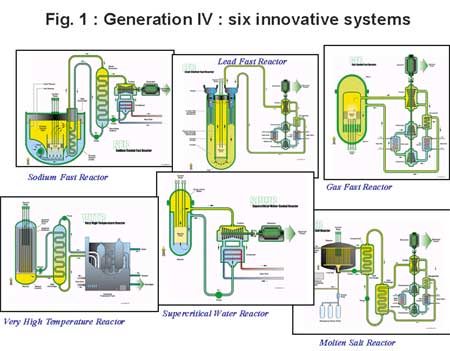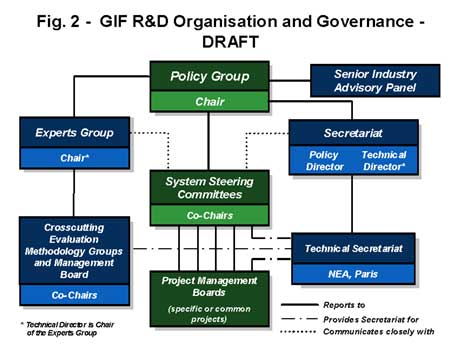 |
 |
Issue No.4 Spring
|
| Editorial: UK study |
| ENS News |
|
ENS Vienna General Assembly
|
| ENS Events |
|
|
| Member Societies & Corporate Members |
| 5-6 May
Slovakian conference
|
| European Institutions |
| Council of the European Union 'Nuclear package'
Euratom loan: Cernavoda-2
|
| ENS World News |
|
NucNet news |
  |
| _____________________ |
| _____________________ |
|
|
|
Frank Carré and Gian Luigi Fiorini
|
Generation IV Forum Zurich meeting leads to progress
by Frank Carré and Gian Luigi Fiorini, French Atomic Commission (CEA)/Nuclear Energy Division
The Generation IV Forum (GIF) Policy Group meeting, held in Zurich on 26-27 January 2004, led to progress on three main topics: the co-operation agreement at system level, the governance of the Forum, and relations with other organisations.
In Zurich, the US Department of Energy (DOE) presented a draft system agreement – jointly prepared by its State and Trade Departments – covering the first 10 years of co-operation (and providing for extensions in five-year increments). This project of agreement will establish the R&D framework required to address Generation IV system feasibility issues, as well as to confirm system performance, established during the system selection process. Future phases of demonstrating and commercialising the six selected nuclear systems will be the subject of further agreements. The parties to this system agreement are intended to be governmental entities or mandated national laboratories. GIF members are to be invited to give their input on the draft system agreement, which is expected to be finalised by mid-2004.
As regards the organisation and the governance of the GIF, the principles proposed at the previous meeting (on 24-26 September 2003 in Toronto) were confirmed, and the main focus of the discussion was on the role of the OECD/NEA as support to the Technical Secretariat of the GIF. The following decisions were made:
-
W. Magwood of DOE was elected as the GIF Policy Group’s chairman, for three years. His appointment officially began on 1 January 2004, and he will be assisted by two co-chairmen: J. Bouchard of the French Atomic Commission, CEA and Y. Sagayama of JNC;
-
the principles of organisation and governance will be the subject of Policy Statements intended to complement the charter of the GIF;
-
a Policy Secretariat assists the chairman of the Policy Group during its three-year mandate, whereas a Technical Secretariat provides ongoing support to the technical activity of the GIF and centralises data integration.
-
the Policy Group confirmed the organisational structure (in Figure below).
-
all GIF members agreed to give the mandate to the NEA to act as the Technical Secretariat.
Concerning the relationship between the GIF and the INPRO initiative,
which falls under the auspices of the IAEA, a series of meetings
and exchanges have had the objective of defining those factors
which are complementary and to provide project co-ordination:
-
INPRO is viewed as intending to refine users’ requirements and methodology, in order to assess the suitability of a nuclear technology to IAEA-affiliated countries and to facilitate exchanges of public GIF information to non-GIF member countries; and
-
GIF will consider the users’ requirements developed by INPRO, especially with a view to enlarging the criteria to make the sustainability of nuclear power a reality.
Among the four GIF countries which are not INPRO participants (the United States, Japan, the United Kingdom and France), France is the only one which has decided to join this initiative.
Furthermore, the GIF will benefit from the advice of a Senior Industry Advisory Panel constituting high-level representatives of the industry, in a position to make recommendations on long-term strategic considerations, including industrial, technical, commercial and statutory aspects. The GIF will also interact with the heads of GIF member countries’ safety authorities. A first exchange of this nature, involving GIF Policy Group members, took place at the Toronto meeting. At this meeting the importance of the IAEA safety standards were underscored as establishing reference criteria and contributing to international harmonisation.
Finally, the following progress has been achieved in preparing the R&D plans for Generation IV systems:
-
the Experts Group, which advises the Policy Group, reviewed the current version of the R&D plans drafted for the GFR, SCWR, SFR and VHTR systems, and, in December 2003, issued guidelines for the provisional Steering Committees for these systems to make improvements to these documents by mid-2004;
-
the Policy Group decided to set up a provisional Steering Committee for the Lead Fast Reactor, with the United States, Japan, South Korea, Switzerland, and Euratom as participants; and
-
establishing a Steering Committee for the Molten Salt Reactor, which was debated by the Policy Group in January, is to be re-examined at the next meeting (May 2004).
In conclusion, preparations for the GIF’s collaborative
phase are actively progressing, both in terms of harmonising views
on multilateral co-operation agreements, and sharing R&D work
among the GIF member countries. This provides excellent prospects
for the international development of the selected six Generation
IV systems being initiated in 2004.
More information on the status of the Generation IV initiatives, is on the ENS website.


| |
